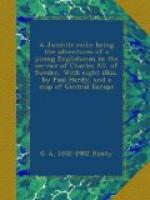“Charles has sent every assurance that he has no ill will towards Poland, and is an enemy not of the country but of its king—who had formed a coalition against him in a time of profound peace—and that his hostility will altogether cease with the overthrow and expulsion of Augustus. So you see, we who live at a distance from the capital, and hold ourselves altogether aloof from the intrigues of court, look on at the fray as if it were one in which we have no part or lot. If Augustus drives out the Swedes, we shall probably have trouble with him afterwards. If Charles drives out Augustus, we shall have a fresh king, and shall no doubt choose one upon the recommendation of Charles, who will then march away again, leaving us to manage our own affairs. Therefore, we have no animosity whatever against you as a Swedish officer, but for comfort’s sake it is better that nothing should be said of this, and that I should introduce you to my friends simply as an English gentleman, who has rendered me the greatest possible service.”
The countess retired to bed, a short time after they had finished their meal, and the others sat up talking until late in the evening. Charlie learnt that the country was still in a greatly disturbed state. Parties of disbanded soldiers and others, rendered desperate by cold and hardship, were everywhere plundering the peasantry, and many encounters had taken place between them and the nobles, who, with their retainers, had marched against them. Travel would be dangerous for a long time to come.
“Therefore, until the spring, you must not think of moving,” the count said. “Indeed, I think that your best plan, when you start, will be to work due north, and join the Swedish forces near Narva. It will be shorter as well as less dangerous. Still, we can talk of that later on.”
The next morning they started early, and arrived in the afternoon at the chateau of the count. It was not a fortified building, for the Poles differed from the western nations, abstaining from fortifying their towns and residences, upon the ground that they were a free people, capable of defending their country from foreign invasion, and therefore requiring no fortified towns, and that such places added to the risks of civil war, and enabled factions to set the will of the nation at defiance.
The building was a large one, but it struck Charlie as being singularly plain and barn-like in comparison with the residences of country gentlemen in England. A number of retainers ran out as they drove up into the courtyard, and exclamations of surprise and dismay rose, as the wounds on the horses’ flanks and legs were visible; and when, in a few words, the count told them that they had been attacked by wolves, and had been saved principally by the English gentleman and his follower, the men crowded round Charlie, kissed his hands, and in other ways tried to show their gratitude for his rescue of their master and mistress.




